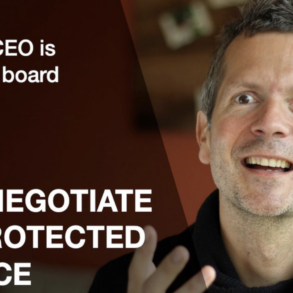By Timm Urschinger and originally published as Part 2 on LinkedIn.com.
This article is part of a series. Part 1 is here. The original Part 2 is EE Magazine’s Part 2a here and Part 2b below.
2. Wholeness
In Amber, Orange and Green organisations people often wear a mask to hide their emotional or (what is considered) “feminine” side during work.
Very little attention is paid to feelings – or can you remember a senior leadership or board meeting where somebody said: “I can’t explain it, it’s my gut feeling though” and you took the decision based on that without taking a look at any numbers? Or when was the last time you had a mindfulness practice in one of your meetings, honouring that there might be emotions in the room? Did you ever experience that this mask-wearing and acting as if you were somebody else is really exhausting? I have!
In Teal Organisations, however, the human desire of wholeness is respected. People are invited to be themselves – fully, with all their feelings, what might be going on in their lifes (maybe stress causing things like relationship difficulties, or sick children etc.).
In some Teal Organisations, employees bring their kids and dogs with them or can take part in courses like meditation classes during work. The aim is not to turn the organisation into a playground for adults. Work and good performance is still the reason for coming together and is of course essential to keep the company profitable.
Wholeness means to change the conditions, to set up a frame where human needs and desires are respected instead of treating employees like machines.
My firm belief is that this does not only make people in organisations happier, but also more productive and efficient, which then again serves the profit of companies in a traditional sense.
3. Evolutionary Purpose
Vision or mission statements often intent to express the purpose of an organisation. For today’s dominant management paradigms (Orange) this means the need to define a winning strategy and to follow it strictly.
In Teal paradigms, however, the organisation is considered a living entity, having its own energy, sense of direction and desire to manifest something in the world. So what leaders need to do is sensing what is going on in the organisation. There is no strategy for how to predict and control. They sense and respond, which makes them more innovative.
Also an important paradigm in the Evolutionary Purpose is that purpose always trumps profit. If my purpose is to cure patients, well then, I better take a decision that will support that and not (only) my profitability.
You might now think that it is really naive to think this might work, but actually there are plenty of examples where this principle is lived and makes the company successful.
Do not get me wrong – I am not saying you should not be profitable as a company. My company, as well as any other company, needs and wants to earn money, but it is not our primary purpose.
Our primary purpose for example is to unleash the potential of individuals and companies to make this world a more sustainable one in a catalytic way (and to do science around how catalysis works!).
Does this mean we work for free? Does this mean I do not check our bank account regularly? Does this mean I just hire people without thinking of whether I am able to pay their salaries? Of course not! Every company needs to be profitable at the end.
It is just turned around: I will follow our purpose, do the right thing and trust that this will be exactly what our customers need and are willing to pay for. Look at Patagonia for example, which is an outdoor company. They decided to go for more sustainably produced cotton, because they care a lot about nature and it is part of their purpose. Many analysts said this was a crazy move, simply because they could not compete in price anymore.
Now guess what, people who buy outdoor equipment also care about the nature and so liked that move a lot. Patagonia is now one of the leading companies and that segment and many more followed Patagonia’s example of sustainably produced cotton. Win-win situation for profit and purpose, but the initial decision was taken by “purpose over profit”.
I already shared some learnings from us in the explanation, but maybe let’s have a look at what this really means on a day-to-day basis for our work and decision.
What does purpose over profit mean for me and for us as an organisation? When did it last impact our decision making?
This year in August we had a retreat to the Swiss Alps to see where we stand as a company. We used to analyse our current and the next bottle neck of all the factors that impact our company. On the list of factors there were of course financials, people/resource, clients & projects, but also purpose.
What we figured is that although our company was doing great, we did not do much to honour our purpose. We would not have assignments contradicting to the purpose, but also nothing really to support it.
Then we asked ourselves what the next potential limiting factor could be if we solved the purpose problem, and clearly it was having the right people and let the company grow. This made it even more evident: find the right people we had to do something to support our purpose.
Coming back to our purpose statement you might remember that we really care about supporting organisations in a catalytic way – but how does catalysis really work? There is only little science around this and our purpose is to explore this more, too.
So, in Q4 this year we decided to spend a significant amount of money to research this a bit more. We are currently exploring a partnership with a micro-loan organisation, investing in 50-100 projects and seeing what the catalytic effect on these will be.
Could we have invested in more bonus for our people? Or in new office facilities to make them happier? Or should we have maybe invested in more marketing to show our customers what great things we do? Of course, we could have done so and it probably would have made sense.
But at this stage we thought about our purpose and thought it might be more important. Next time we might decide differently.
The learning we are having with purpose is: it should help to challenge your decisions and give you a holistic view on them (not just the profit-view).
In the next article I will explore more on what Wholeness really means for our company, how important creating a safe space (or rich space) is and mention some practical tips from our experience – and maybe get some of you agility, self-organisation evangelists to think a bit less about the (indeed interesting!) processes and more about what the people component in this might be.
Please also comment on this article and share your thoughts – even if you think it is completely naïve, crazy or whatever. I am looking forward to having a fruitful discussion.
Republished with permission.
Featured Image and some paragraph spacing added by Enlivening Edge Magazine.




